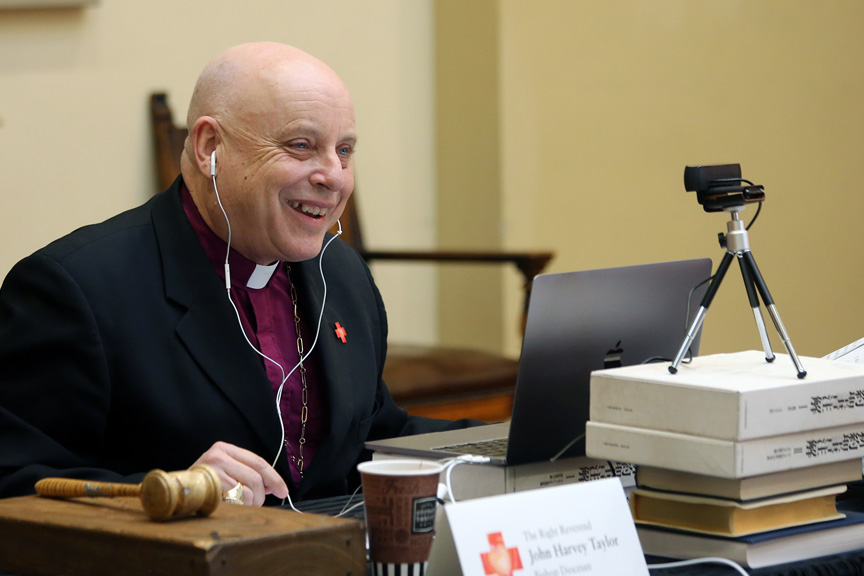
Bishop John Harvey Taylor chairs the virtual convention from a desk in the Great Hall at St. Paul’s Commons. Photo: Janet Kawamoto
Although in the midst of “Covid exile” with the number of new infections rising, Southland Episcopalians remain “servants of the Spirit of the risen Christ and not the spirit of the age,” Bishop John Harvey Taylor told nearly 1,000 Zoom, Facebook and YouTube viewers Nov. 14 during the 125th annual — and first-ever virtual — meeting of the Episcopal Diocese of Los Angeles.
At a convention redesigned in response to the pandemic, Taylor advanced a vision of liberating love, evangelizing servanthood, galvanizing community and a new financial paradigm.
Bishop Suffragan Diane M. Jardine Bruce, celebrating the tenth anniversary of her consecration this year, also congratulated congregations for “stepping up” in spite of stay-at-home orders and suspension of indoor worship.
“Across the board, you all stepped up – from your reaching out to your membership, to seeing the needs of the community around you and being Servants of the Spirit by feeding and caring for those most in need spiritually and physically.”
Taylor also announced that retired Bishop J. Jon Bruno has been “once again fully vested with all his sacramental privileges as confirmed by ordination and preparing to celebrate his birthday on Tuesday.”
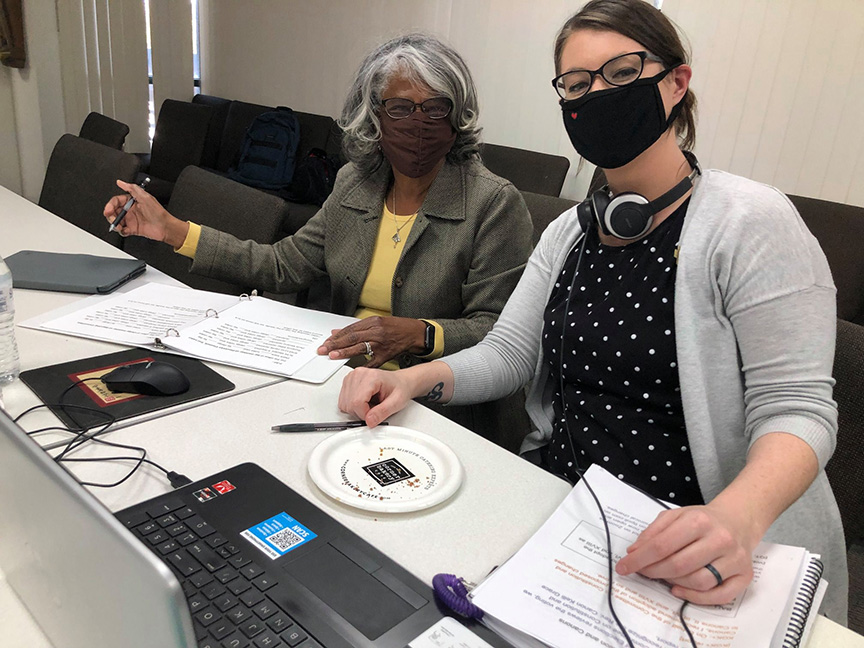
Judge of Elections Canon Patti Jo McKay and Convention Coordinator Samantha Wylie compare notes before voting begins. Photo: Janet Kawamoto
A liberating love
The pandemic freed many Southland congregations to envision ministry and connection in new ways, Taylor said. Like “the parish church that launched a new food ministry after the quarantine began and now gives away six to eight tons every week.”
And “Seeds of Hope, which has served the equivalent of 10.3 million meals so far this year, mostly during the pandemic. The mission church housing asylees so they can get out of Adelanto. Showers and meals and shelter for the homeless from Ojai to Long Beach and under active consideration in Tustin. Laundry Love still going strong all over the diocese.”
At least three congregations — St. Michael’s Ministry Center, Riverside; Blessed Sacrament Church, Placentia; and St. Joseph’s Church, Buena Park — have received local governmental approval during the pandemic for campus housing projects for either the homeless or seniors.
An upcoming five-week book study will underscore the power of this liberating love, Taylor said. The sessions, beginning Wednesday, Nov. 18, will focus on Presiding Bishop Michael Curry’s latest book, Love is the Way: Holding on to Hope in Troubling Times. It is not necessary to have a copy of the book to participate, Taylor noted.
Curry served as keynote speaker for the Nov. 7 Bishop’s Gala, a fundraiser that netted more than $100,000 for diocesan ministries and Bloy House, Taylor said. Contributions are still accepted here. “You can still contribute, and if you give at least $200, you will get an autographed copy of Bishop Curry’s book,” Taylor said.
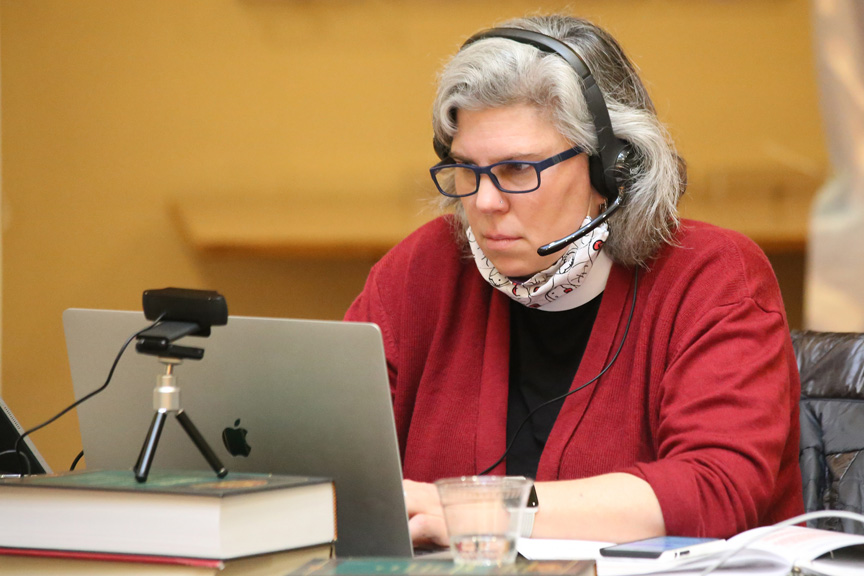
Canon to the Ordinary Melissa McCarthy oversees all aspects of Diocesan Convention both online and at St. Paul’s Commons. [JK]
Evangelizing servanthood
The ministry of Deacons embodies servanthood, which Jesus identified as evangelism, Taylor told the gathering.
“During the pandemic, I’ve been more than usually aware of our deacons and their varied ministries — as ministers of the liturgy in our quarantined churches while also continuing to pastor to their people, to serve the incarcerated, the asylee and immigrant, and to serve the food-and housing insecure,” Taylor said. He highlighted “Voices of Vocation: Deacons in Action,” a video series about the ministry of Southland deacons, available on the diocesan website.
Youth service at convention shifted this year, from guarding doors, running errands and passing “Parker” buckets to collect donations for Episcopal Relief and Development to leading the daily office, along with Canon Jim White, co-chair of the diocesan Commission on Ministry. Donations for Episcopal Relief & Development and the One Body and One Spirit Emergency Appeal moved online and are still accepted here.
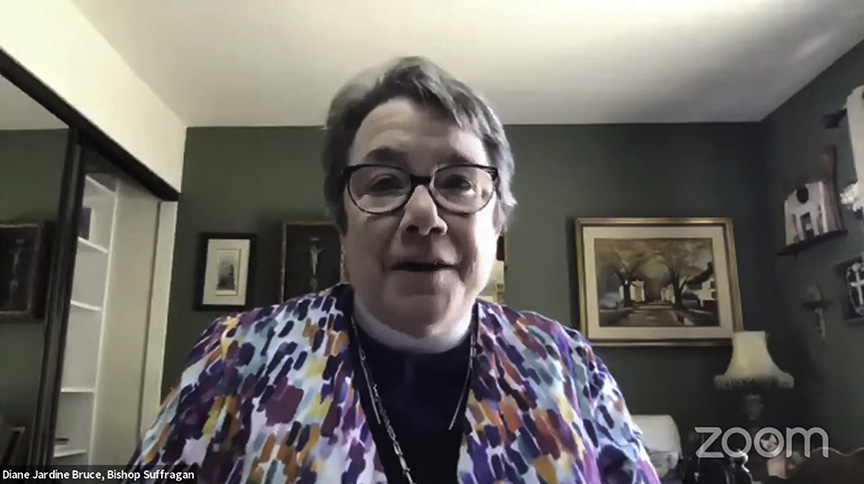
Bishop Suffragan Diane M. Jardine Bruce delivers her address to convention from her home office via Zoom.
Galvanizing Community
A New Community Ministry online offering, “Trauma and (Un)truths: Promises Broken in God’s Name,” about the Doctrine of Discovery, Racial Identity and Racial Capitalism, was just one example of many engaging sessions this year, with additional events planned for 2021, Bishop Bruce said in the suffragan bishop’s address.
Additionally, the pandemic’s disproportionate impact upon New Community members was visceral in communities like St. Michael’s, Anaheim, “where the vast majority of the more than 400 Episcopalians who worship there every Sunday are Disney-dependent – meaning their jobs are tied to the park or the businesses around the park, were all out of work or if they weren’t out of work, their hours were severely cut back in this pandemic.”
Also, she said, “just talk to the Rev. Juan Jimenez about the number of people he has buried out of St. Michael’s.”
Similarly, the murder of George Floyd and other African Americans at the hands of law enforcement galvanized the need to address systemic racism’s impact on those who “live this day in and day out,” Bruce said.
Multilingual leadership training continues, through the Iona Collaborative, the Li Tim-Oi Institute in Mandarin and Instituto de Liderazgo in Spanish. Plans are underway to make coursework available in online video presentations, for use across The Episcopal Church.
Bruce invited the diocesan community to the upcoming virtual celebration of the life and legacy of the Rev. Dr. Martin Luther King Jr., at 4 p.m. Saturday, January 16 via Zoom and livestream.
Taylor also announced an upcoming Dec. 8 online visioning session to address issues of police violence and community safety and to help bridge differences through relationship-building, sharing stories “and counting on the reconciling spirit of Christ to do what Jesus promised it would do: Bring us together for the glory of God and the sake of all God’s people.”
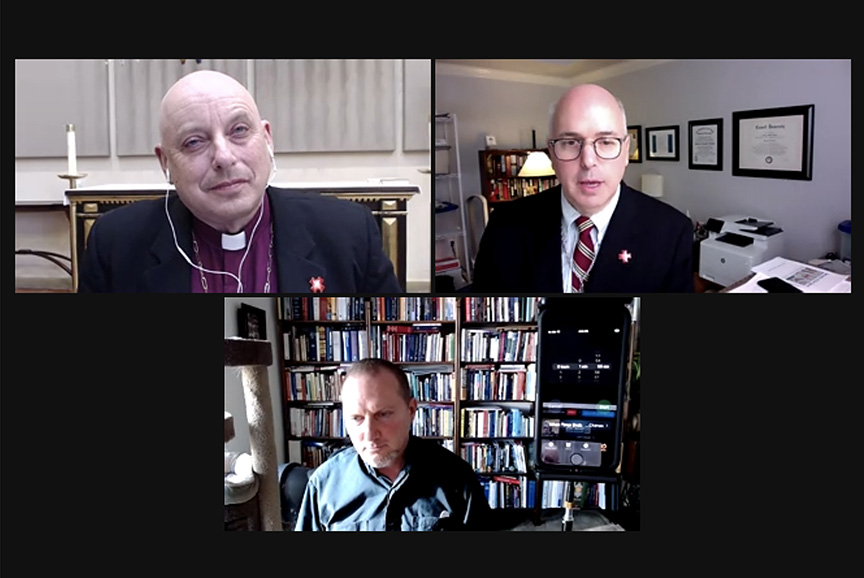
Bishop John Harvey Taylor, Canon Andy Tomat, treasurer, and Michael Bell, chair of the Committee on Dispatch of Business, lead and monitor the discussion of the 2021 diocesan budget.
A new financial paradigm
Taylor also called for a new financial paradigm to help fund “a brighter” future for diocesan mission and ministry.
“Balancing next year’s budget required us to reach deep into cash reserves in a way that prudence will not enable us to repeat,” he said. The two pillars of that paradigm are the Mission Share Fund and the upcoming capital campaign, which aims to raise up to $40 million “in endowment funds to support local congregations, to keep serving their neighborhoods.”
The time has come for a new conversation about the core purpose of parish giving, Taylor said. Mission congregations are required to contribute 10% of annual plate and pledge income to the mission share fund. Parishes are required by canon to give 12-15% of their general operating budget, but “we nevertheless still use pledge language,” he said.
“But we don’t pledge to our families,” Taylor said. “It’s not discretionary. We feed them, we house them, we care for them, no matter what. We put them first, ahead of ourselves. We give them the first fruits of our hearts and, often, the first and last thoughts of our waking days.”
Canon Andy Tomat, diocesan treasurer, added: “We as a diocese need to have a conversation … to look at it, not so much from a cost standpoint, but what has been termed a theology-of-abundance standpoint.”
Taylor also thanked those whose generous gifts totaling $207,000 to the One Body, One Spirit Covid-19 Emergency Appeal have enabled 18 grants, a total of $73,500, to parishes and missions hard-hit by the pandemic. The appeal will continue as long as the emergency does, he said, inviting the diocesan community to strive for a $250,000 goal by year-end, “because we’re all in this together, (which) means that we can’t leave a single soul behind.”
The diocesan Program Group on Stewardship, along with The Episcopal Network for Stewardship (TENS), offered programming to aid congregations with launching online giving, Bruce said.
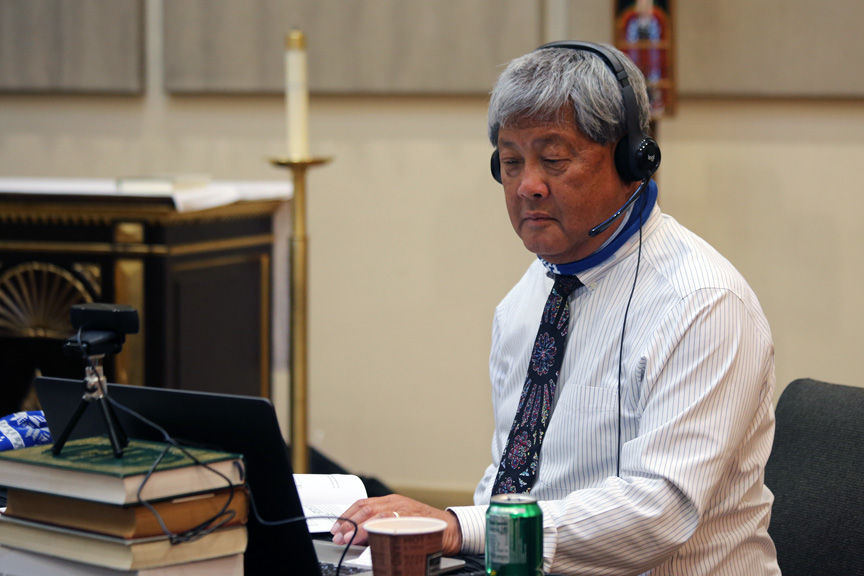
Secretary of Convention Canon Steve Nishibayashi follows convention proceedings via laptop computer. [JK]
More convention business
Delegates approved a $6 million budget for next year, down from the nearly $7 million budget in 2021. The budget represents a 12% reduction and severe cuts to diocesan ministries.
Convention resolutions recognized several Evangelical Lutheran Church in American pastors with seat, voice and vote. Retiring clergy were acknowledged, including: Bishop. J. Jon Bruno and Bishop Suffragan Chet Talton, the Rev. Canon Joanna Satorius; the Rev. David G. Davidson-Methot; the Rev. Mark Henrickson; the Rev. Bruce Anthony Keller; the Rev. Connie Lamb; the Rev. Marilyn Omernick; and the Very Rev. Sylvia Sweeney.
Additionally, convention delegates elected officers for various diocesan posts: a list is here.
Also approved were proposed changes to Canon II, clarifying alternative communities as mission centers, and allowing for updating of the diocesan policy and procedures manual for mission congregations and centers. Concurrent changes to Canons III, VI and XVIII were approved to keep consistent the defined use of “mission” in the remaining provisions of the Canons.
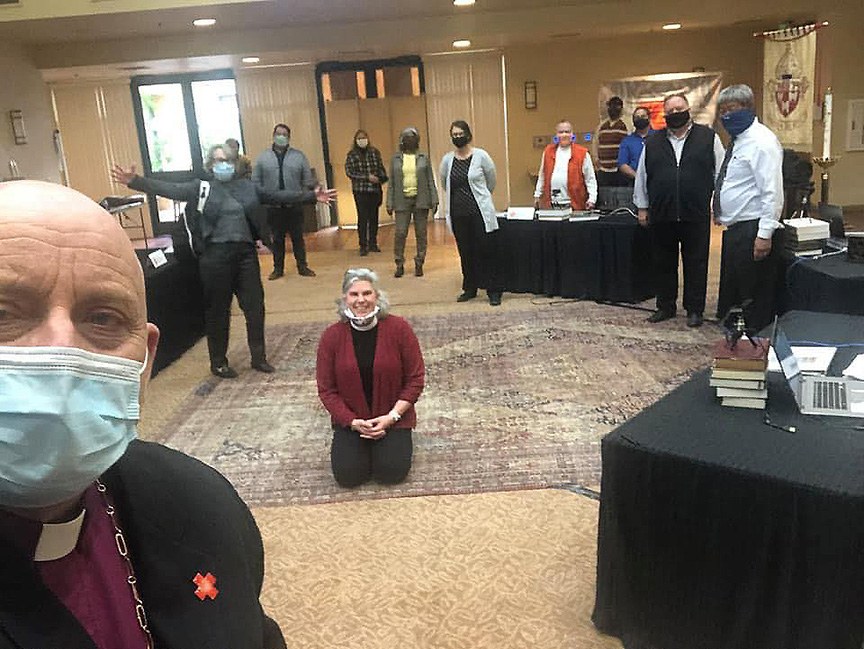
Bishop John Harvey Taylor gathers most of the convention team in the Great Hall at the end of Nov. 14 proceedings for a distanced photo. Clockwise from lower left: Taylor, Canon to the Ordinary Melissa McCarthy (kneeling at center), Vice-Chancellor Julie Dean Larsen, front-desk host Brother Ambrose (partially hidden), Youth Missioner Gabe Vasquez-Reyes, Episcopal News editor Janet Kawamoto, Judge of Elections Patti Jo McKay, Convention Coordinator Samantha Wylie, Assistant Secretary of Convention Tom Quijada-Discavage, technical consultant Ara Arsenian, St. Paul’s Commons Building Superintendent Luis Garibay, Canon for Community Life Bob Williams, and Secretary of Convention Steve Nishibayashi. Photo: John Taylor
A virtual exhibit hall will remain online through year-end, according to convention coordinator Samantha Wylie.
Convention addresses may be viewed on YouTube and the diocesan Facebook page. The concluding Eucharist may be viewed on the same channels. (See related story here.)
Canon Steve Nishibayashi, secretary of convention, said the 126th annual meeting of the diocese is scheduled for Nov. 12 – 13, 2021, at the Riverside Convention Center.
A gallery of photos from convention is here.
